Private library: information etiquette, preparation for large projects, lean manufacturing, space exploration
Redmadrobot Development Director Max Voloshin has compiled the top 5 useful books - for personal efficiency and business efficiency. And also for lovers of quality science fiction.
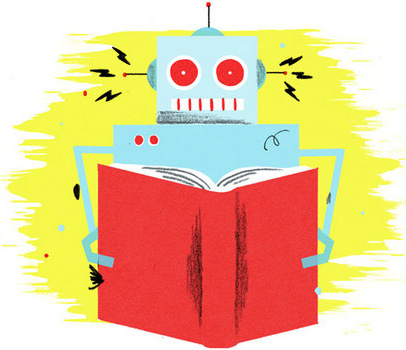
Roland Hundford “The Conquest of the South Pole. Leadership Race
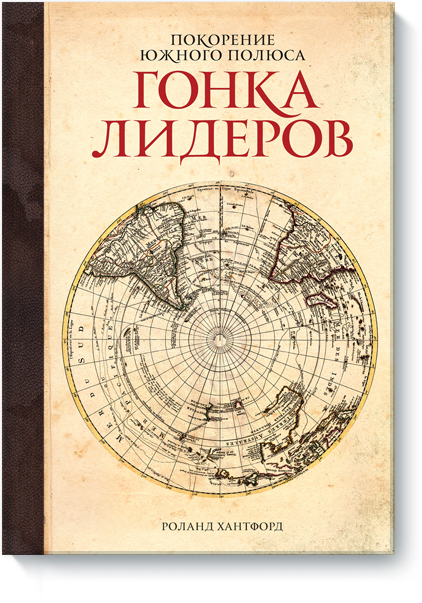
In the “Conquest of the South Pole”, two life paths are described which are completely different in temperament and in the education of people: the Norwegian Amundsen and the British Scott. The narrative is sometimes tricky, but in general it reveals well the formation of each of the travelers before the start of the struggle for the South Pole, and already in detail, through diary entries, shows the process of the race itself. The problems of forming a team and working in it are discussed in great detail. Roland Huntford, the author of the book, focuses on this topic and analyzes it from different points of view: his own, Scott and Amundsen. It turns out a kind of express-course psychological training Star City.
I have already said that keeping a diary is extremely useful. Why did polar explorers keep journals even at the planning stage of expeditions? To preserve and comprehend the most valuable practical experience.
For those who are building their business or working on projects within already established businesses, it will be especially interesting to read “The Conquest of the South Pole”. The book is excellent "includes the head": you begin to very clearly see your own weaknesses and think about how to be with them further.
The basic idea: you can not neglect the opportunity to learn from your own and other people's experience, it is critically important for the effective movement towards truly great goals.
')
Andy Weier “The Martian”
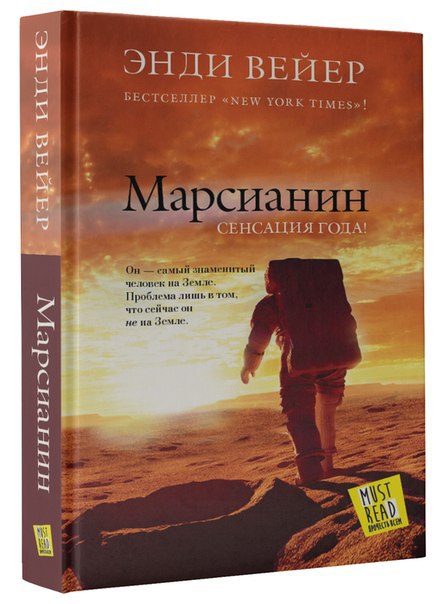
The author is an American programmer who loves science fiction. He is fond of space and programs for the development of planets in the solar system. “The Martian” is, on the one hand, a classic science fiction novel with a lot of numbers, a real scientific base and an explanation of how to make water out of hydrogen fuel. On the other hand, it is a fascinating reading about the XXI century Robinson Crusoe - a man who was left on Mars and who could not only survive but also maintain a great sense of humor. The book is about willpower, problem solving and planning, such planning, on which depends not just deadline for a couple of weeks or reduced margins, but life. Well, the diary style of presentation on behalf of the main character is a good example of the practical application of reflection: without pens, to achieve a result. In general, this is an excellent mix of the book “The Conquest of the South Pole. Leadership Race and the film Gravity.
Henry Ford “My life, my achievements”

The book is a description of the first steps of the scientific organization of labor and a kind of introduction to lean production . Some topics are suspiciously in common with Atlas Shrugged Ayn Rand, especially about money, which is primarily a measure of labor, not a source of income, and about the importance of industry in the development of the country, and of the world in general. The main idea of the book Ford is that the company must be profitable if it produces a really useful product or provides a useful high-quality service at an attractive price. But in the way of profitability is the imperfection of business processes and management, which is a source of unnecessary costs of time, material and human resources, through which all profits flow. To prevent this from happening, it is necessary to decompose the business, analyze all production flows, both informational and material, describe them, put them into the system, and set up monitoring of problem nodes (essentially Root Cause Analysis ) and the mechanism for their subsequent modification. It was important for Ford 100 years ago, but it is still relevant for us.
And the main thing: work should be a matter of life, and not just a source of money in order to spend it on work from work in the evening. Work is not only an opportunity for personal development, but also an opportunity to change the world. Incredibly stupid to neglect this.
Mark Hirst “Do not boil the pot! How to curb the endless stream of letters and tasks ”
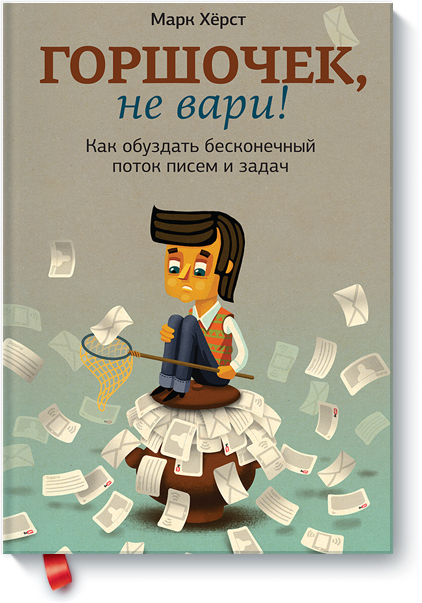
This book is about information etiquette or even more accurate to say - informational hygiene. Hurst, a specialist in personal productivity and IT consulting, sets out in detail the principles of working with mail (writing approach), strategic tasks, data storage and streamlining of information channels multiplying in a geometric progression. The author promotes the principle of “zero Inbox”: mail is not a bottomless repository of text junk, it is an important communication tool for receiving and sending information. For arrangements, materials and tasks there are special tools. A separate topic is postal etiquette aimed at respecting someone else's time. How to overcome redundancy and bring the message as clear as possible, quickly and “straight to the head” to the addressee. Such a light version of the Principle of the Pyramid of Minto . In general, the book is good to tune its systems, add useful updates to them.
Mike Rowdy “Visual Notes
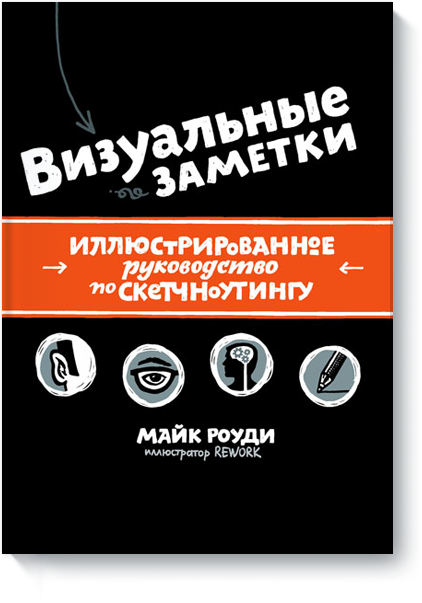
Mike Rowdy - UX / UI Designer and Illustrator. At some point, he decided to adapt and extend his graphic experience to areas far from design. For those who have not yet used schematization in the records, this book is a good first step. For those who use, there are interesting finds, for example, a personal visual library (your own stylized guide). It is read very easily (in a few hours), well structured, the excess information is practically absent. Rowdy, by the way, has an interesting personal blog .

Roland Hundford “The Conquest of the South Pole. Leadership Race

In the “Conquest of the South Pole”, two life paths are described which are completely different in temperament and in the education of people: the Norwegian Amundsen and the British Scott. The narrative is sometimes tricky, but in general it reveals well the formation of each of the travelers before the start of the struggle for the South Pole, and already in detail, through diary entries, shows the process of the race itself. The problems of forming a team and working in it are discussed in great detail. Roland Huntford, the author of the book, focuses on this topic and analyzes it from different points of view: his own, Scott and Amundsen. It turns out a kind of express-course psychological training Star City.
I have already said that keeping a diary is extremely useful. Why did polar explorers keep journals even at the planning stage of expeditions? To preserve and comprehend the most valuable practical experience.
For those who are building their business or working on projects within already established businesses, it will be especially interesting to read “The Conquest of the South Pole”. The book is excellent "includes the head": you begin to very clearly see your own weaknesses and think about how to be with them further.
The basic idea: you can not neglect the opportunity to learn from your own and other people's experience, it is critically important for the effective movement towards truly great goals.
')
Andy Weier “The Martian”

The author is an American programmer who loves science fiction. He is fond of space and programs for the development of planets in the solar system. “The Martian” is, on the one hand, a classic science fiction novel with a lot of numbers, a real scientific base and an explanation of how to make water out of hydrogen fuel. On the other hand, it is a fascinating reading about the XXI century Robinson Crusoe - a man who was left on Mars and who could not only survive but also maintain a great sense of humor. The book is about willpower, problem solving and planning, such planning, on which depends not just deadline for a couple of weeks or reduced margins, but life. Well, the diary style of presentation on behalf of the main character is a good example of the practical application of reflection: without pens, to achieve a result. In general, this is an excellent mix of the book “The Conquest of the South Pole. Leadership Race and the film Gravity.
Henry Ford “My life, my achievements”

The book is a description of the first steps of the scientific organization of labor and a kind of introduction to lean production . Some topics are suspiciously in common with Atlas Shrugged Ayn Rand, especially about money, which is primarily a measure of labor, not a source of income, and about the importance of industry in the development of the country, and of the world in general. The main idea of the book Ford is that the company must be profitable if it produces a really useful product or provides a useful high-quality service at an attractive price. But in the way of profitability is the imperfection of business processes and management, which is a source of unnecessary costs of time, material and human resources, through which all profits flow. To prevent this from happening, it is necessary to decompose the business, analyze all production flows, both informational and material, describe them, put them into the system, and set up monitoring of problem nodes (essentially Root Cause Analysis ) and the mechanism for their subsequent modification. It was important for Ford 100 years ago, but it is still relevant for us.
And the main thing: work should be a matter of life, and not just a source of money in order to spend it on work from work in the evening. Work is not only an opportunity for personal development, but also an opportunity to change the world. Incredibly stupid to neglect this.
Mark Hirst “Do not boil the pot! How to curb the endless stream of letters and tasks ”

This book is about information etiquette or even more accurate to say - informational hygiene. Hurst, a specialist in personal productivity and IT consulting, sets out in detail the principles of working with mail (writing approach), strategic tasks, data storage and streamlining of information channels multiplying in a geometric progression. The author promotes the principle of “zero Inbox”: mail is not a bottomless repository of text junk, it is an important communication tool for receiving and sending information. For arrangements, materials and tasks there are special tools. A separate topic is postal etiquette aimed at respecting someone else's time. How to overcome redundancy and bring the message as clear as possible, quickly and “straight to the head” to the addressee. Such a light version of the Principle of the Pyramid of Minto . In general, the book is good to tune its systems, add useful updates to them.
Mike Rowdy “Visual Notes

Mike Rowdy - UX / UI Designer and Illustrator. At some point, he decided to adapt and extend his graphic experience to areas far from design. For those who have not yet used schematization in the records, this book is a good first step. For those who use, there are interesting finds, for example, a personal visual library (your own stylized guide). It is read very easily (in a few hours), well structured, the excess information is practically absent. Rowdy, by the way, has an interesting personal blog .
Source: https://habr.com/ru/post/245535/
All Articles